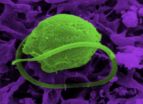(Press-News.org) Scientists at the Johns Hopkins Kimmel Cancer Center have combined the ability to detect cancer DNA in the blood with genome sequencing technology in a test that could be used to screen for cancers, monitor cancer patients for recurrence and find residual cancer left after surgery.
"This approach uses the power of genome sequencing to detect circulating tumor DNA in the blood, providing a sensitive method that can be used to detect and monitor cancers," says Victor Velculescu, M.D., Ph.D., professor of oncology and co-director of the Cancer Biology Program at Johns Hopkins.
A report describing the new approach appears in the Nov. 28 issue of Science Translational Medicine. To develop the test, the scientists took blood samples from late-stage colorectal and breast cancer patients and healthy individuals and looked for DNA that had been shed into the blood.
The investigators applied whole-genome sequencing technology to DNA found in blood samples, allowing them to compare sequences from cancer patients with those from healthy people. The scientists then looked for telltale signs of cancer in the DNA: dramatic rearrangements of the chromosomes or changes in chromosome number that occur only in cancer cells.
No signs of cancer-specific chromosome changes were found in the blood of healthy individuals, but the investigators found various cancer-specific alterations in the blood of all seven patients with colon cancer and three patients with breast cancer. Using specialized bioinformatic approaches, they were able to detect these alterations in a small fraction of the millions of DNA sequences contained in the blood sample.
"This is proof of the principle that genome sequencing to identify chromosomal alterations may be a helpful tool in detecting cancer DNA directly in the blood and, potentially, other body fluids," says Rebecca Leary, a postdoctoral fellow at Johns Hopkins. "But larger clinical trials will be needed to determine the best applications of this approach."
The investigators note that there may be less circulating DNA in early stage cancers, and, thus, these would be more challenging to detect without more extensive sequencing. As sequencing costs decrease, the investigators expect that detecting earlier-stage cancers may become more feasible.
Velculescu says that additional research will focus on determining how the new test could help doctors make decisions on treating patients. For example, the blood test could identify certain chromosomal changes that guide physicians to prescribe certain anti-cancer drugs or decide patient enrollment in clinical trials for drugs that target specific gene defects. Currently, physicians use cellular material biopsied from the original tumor to make these decisions, but tumor material can often be inaccessible or unavailable.
The Johns Hopkins study builds on the team's earlier work using genomic sequencing of DNA in the blood to find rearrangements of chromosomes. The previous work required samples of the original tumor and knowledge of DNA changes in that tumor to find those same changes in the blood. This new test has no need for original tumor samples and includes an analysis of changes in the copy number of chromosomes.
"It's an evolution of technologies we're developing for cancer diagnosis, and, by combining our knowledge, we can build better ways to detect disease," says Luis Diaz, M.D., an oncologist and director of the Swim Across America laboratory at Johns Hopkins.
INFORMATION:
Funding for the study was provided by the National Institutes of Health (CA121113, CA057345, CA043460), The European Community's Seventh Framework Programme, the Virginia & D.K. Ludwig Fund for Cancer Research, the American Association for Cancer Research Stand Up to Cancer-Dream Team Translational Cancer Research Grant, the National Colorectal Cancer Research Alliance, the United Negro College Fund-Merck Fellowship, and Swim Across America.
Other scientists contributing to the research include Mark Sausen, Isaac Kinde, Nickolas Papadopoulos, Kenneth Kinzler, and Bert Vogelstein from Johns Hopkins; John Carpten and David Craig from the Translational Genomic Research Institute; Joyce O'Shaughnessy from the Baylor Sammons Cancer Center; and Giovanni Parmigiani from the Dana Farber Cancer Institute.
Kinzler, Vogelstein, Diaz and Velculescu are co-founders of Inostics and Personal Genome Diagnostics and are members of their Scientific Advisory Boards. They own Inostics and Personal Genome Diagnostics stock, which is subject to certain restrictions under Johns Hopkins University policy. The terms of these arrangements are managed by The Johns Hopkins University in accordance with its conflict-of-interest policies. Parmigiani is on the scientific advisory board of Counsyl.
END
A simple formula can predict at birth a baby's likelihood of becoming obese in childhood, according to a study published today in the open access journal PLOS ONE.
The formula, which is available as an online calculator, estimates the child's obesity risk based on its birth weight, the body mass index of the parents, the number of people in the household, the mother's professional status and whether she smoked during pregnancy.
The researchers behind the study hope their prediction method will be used to identify infants at high risk and help families take steps to ...
Scientists at the University of Liverpool have deciphered the genetic code of wheat to help crop breeders increase yield and produce varieties that are better suited to a changing environment.
Wheat is one of the world's most important food crops, accounting for 20% of the world's calorific intake. Global wheat production, however, is under threat from climate change and an increase in demand from a growing human population.
The Liverpool team, at the University's Centre for Genomic Research, used new methods of sequencing DNA to decode the large wheat genome, ...
Boys whose testes have not descended at birth—a condition known as cryptorchidism—are almost three times as likely to develop testicular cancer in later life, finds an analysis of the available evidence published online in Archives of Disease in Childhood.
The findings prompt the authors to ask whether boys with the condition should be regularly monitored to lessen the potential risk
Cryptorchidsim, where testes fail to descend into the scrotum and are retained within the abdomen, is the most common birth defect in boys, affecting around 6% of newborns.
The authors ...
Fort Davis, Texas — Astronomers have used the Hobby-Eberly Telescope at The University of Texas at Austin's McDonald Observatory to measure the mass of what may be the most massive black hole yet — 17 billion Suns — in galaxy NGC 1277. The unusual black hole makes up 14 percent of its galaxy's mass, rather than the usual 0.1 percent. This galaxy and several more in the same study could change theories of how black holes and galaxies form and evolve. The work will appear in the journal Nature on Nov. 29.
NGC 1277 lies 220 million light-years away in the constellation Perseus. ...
HOUSTON – A previously invincible mutation in chronic myeloid leukemia (CML) has been thwarted by an investigational drug in a phase I clinical trial reported in the current edition of The New England Journal of Medicine.
All 12 patients in the trial with chronic phase CML and the T315I mutation had a complete hematologic response (absence of CML cells in the blood) after treatment with ponatinib. Eleven had a major reduction in CML cells in the bone marrow and nine achieved a complete cytogenetic response – no cells in the marrow.
T315I is present in up to 20 percent ...
LOS ANGELES (Nov. 28, 2012) – Cedars-Sinai Heart Institute researchers have found in an initial clinical trial that a drug typically prescribed for erectile dysfunction or pulmonary hypertension restores blood flow to oxygen-starved muscles in patients with a type of muscular dystrophy that affects males, typically starting in childhood or adolescence.
Tadalafil, commonly known by brand names Cialis and Adcirca, reversed the effects of a biochemical chain of events that in Becker muscular dystrophy deprives muscles of an important chemical, nitric oxide, which normally ...
LOS ANGELES — EMBARGOED UNTIL 1 P.M. EST ON WEDS. NOV. 28, 2012 – Surgical teams at Cedars-Sinai have reduced surgical site infections by more than 60 percent for patients who undergo colorectal procedures by introducing evidence-based protocols that are easy to follow and relatively low in cost.
Surgeons, nurses, operating room staff and patients all collaborated in a quality improvement project that measured surgical site infection rates from March 2011 to March 2012. Several new steps were introduced to guard against infections, and these have now been expanded and ...
Microscopic animals held algae captive and stole their genes for energy production, thereby evolving into a new and more powerful species many millions of years ago reveals a new study published today in the journal Nature.
The results reveal a 'missing link' in evolution because the tiny animal thieves (protozoa) couldn't completely hide all evidence of the captive algae, and have been effectively frozen in time and caught in the act by genetic sequencing.
The protozoa captured genes for photosynthesis- the process of harnessing light to produce energy which is used ...
Thanks to NASA's Cassini spacecraft which has been orbiting Saturn since 2004, scientists have been able to observe for the first time ever the seasonal atmospheric circulation direction change on Titan – an event which only happens once every 15 years and is never observable from Earth. Their findings are published today in Nature.
Titan, while technically only a moon, is bigger than the planet Mercury, and is often considered a planet in its own right. It is the only known moon to have a significant atmosphere and is one of only four terrestrial atmospheres in our ...
Scientists have developed a new approach for evaluating past climate sensitivity data to help improve comparison with estimates of long-term climate projections developed by the Intergovernmental Panel on Climate Change (IPCC).
The sensitivity of global temperature to changes in the Earth's radiation balance (climate sensitivity) is a key factor for understanding past natural climate changes as well as potential future climate change.
Many palaeoclimate studies have measured natural climate changes to calculate climate sensitivity, but a lack of consistent methodologies ...



